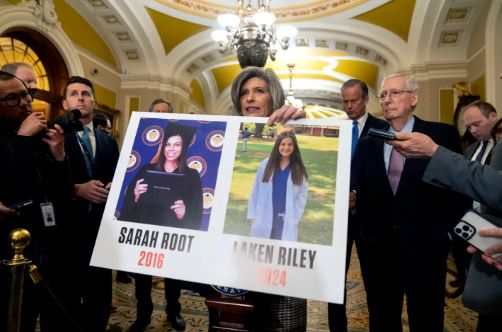

The death of Laken Riley is at the center of Republicans’ hardline immigration pitch to voters.

By Mel Leonor Barclay
Political Reporter
The 19th

By Barbara Rodriguez
State Politics and Voting Reporter
The 19th
Republicans who are pushing for more restrictive immigration policy ahead of a pivotal election year continue to lean on an old strategy in their appeal to voters: broadly framing immigrant men as dangerous next to imagery of young White women victims.
In 2015 it was Kate Steinle, a 32-year-old woman who was fatally shot on a San Francisco pier. A year later, Sarah Root, a 21-year-old Iowa woman, was killed in a crash involving a drunk driver. In 2018, 20-year-old Mollie Tibbetts was killed while jogging in her rural Iowa hometown. Now, it’s Laken Riley, a Georgia college student killed last month while also jogging.
All were White women, and their deaths, linked to immigrant men, became flash points in Republicans’ push for hard-line immigration policies. Led by Donald Trump, the party is using these deaths to call for policies like mass arrests, detention camps and militarized deportations, and pairing that with violent anti-immigrant language.
The rhetoric — which recalls the nation’s long history of racist attacks against men of color by casting them as threats to White women — also threatens the safety of immigrants, advocates say.
Polling shows immigration is increasingly top of mind for many Republicans and some independents ahead of the November elections, a dynamic that could sway the outcome of the rematch between President Joe Biden and Trump.
Riley’s death has become a rallying cry among conservative news and social media commentators and elected officials since Jose Antonio Ibarra, an undocumented immigrant from Venezuela, was charged in connection with her death.
Democrats too, including Biden, have focused significant attention on the case, showing just how much the major parties may engage with more conservative stances on immigration this election cycle.
“This is another case of a White cisgender woman — young, pretty — that’s going to be held up as a poster board for everything that Democrats are doing wrong,” said Nancy Hiemstra, an associate professor at Stony Brook University who studies U.S. immigration enforcement policies. “You can imagine that if Trump were president, Republicans would hold it up as an instance of why they need more money to do a huge crackdown on immigrants, right? So either way, this type of thing is leverage.”
Trump has highlighted the 22-year-old Riley’s death during campaign rallies and on social media, referring to her as an “American daughter.”
“I will fight like no one has ever fought before to ensure that what happened to this American daughter, this incredible American, that this never happens to any other daughter or anyone else ever again,” Trump said in Rome, Georgia, on March 9, during his first rally after becoming the presumptive Republican nominee for president. During the event, Trump also said he would protect “suburban housewives,” who “want security” and” don’t want illegal immigrants coming into this country.”
Deborah Kang, an associate professor at the University of Virginia who studies U.S. immigration and border policy, said such language about security highlights a much longer history, especially in the American South, of white supremacists fighting to protect White women from perceived threats posed by men of color. She added that it echoes a kind of nationalist paternalism.
“So for Trump, one could argue that protecting the homeland and protecting so-called White womanhood are two sides of the same fight,” she said.
The case has even drawn attention from the head of the FBI, with Director Christopher Wray committing that the department will do “everything [it] can to help achieve justice for Laken.”
But Republicans’ messages about undocumented immigrants, particularly as a threat to American women, pose a risk to immigrant communities or people who may be perceived as such, migrant advocates say. That includes Latinx people, who make up the largest share of people entering through the southern border, amid a recorded increase in hate crimes against that group.
“It’s an old tactic and I think it is incredibly dangerous,” said Vanessa Cardenas, the executive director of America’s Voice, a progressive immigration advocacy group. “This whole new strand that’s very much focused on men is particularly damaging and creates the sense that people cannot trust immigrants. … It does put a target on our back, but also poisons any type of progress to get to legislation that could actually help the problem.”

At the State of the Union address earlier this month, Rep. Marjorie Taylor Greene distributed pins with Riley’s face on them. The Georgia Republican also wore a T-shirt throughout the halls of Congress that read, “Say Her Name” — a reference to Riley and a slogan first used to highlight the deaths of Black women at the hands of law enforcement.
Biden responded to Greene’s outburst during his televised speech by calling the suspect in Riley’s death an “illegal” — a move that angered some immigrant advocacy organizations. Biden later apologized.
Republicans in the meantime are invoking Riley in recently proposed immigration legislation. Lawmakers in the Republican-controlled Georgia statehouse are considering a bill that would require state and local law enforcement to identify, arrest and detain undocumented immigrants. A Texas law with similar provisions is on hold amid questions about its constitutionality, as more than half a dozen other states take up similar measures. In Congress, House Republicans earlier introduced a bill, called the Laken Riley Act, that would require federal authorities to detain undocumented immigrants who have been accused of theft.
Trump, who kicked off his 2016 campaign for president by calling Mexican immigrants “rapists,” doubled down on those remarks with a recent campaign video in which the infamous 2015 speech is interspersed with news clips referencing crimes allegedly committed by immigrants.
Biden committed publicly to a “humane” immigration system when he took office, but he has come under scrutiny by immigration advocates for keeping some Trump-era immigration policies in place. His earlier support for a bipartisan immigration bill — opposed by progressives in both chambers — signals just how much Democrats are recalibrating their approach to immigration policy.
Trump, whose administration once orchestrated the separation of immigrant children from their parents at the border as an migration deterrent, has also complicated efforts to address immigration. He publicly denounced the federal immigration bill, which was subsequently tanked by Senate Republicans, arguing that it wasn’t politically advantageous for Republicans to help address issues at the border before the election.
A Gallup survey conducted in February found that for 28 percent of Americans, immigration is the most important problem facing the nation — an increase driven largely by Republicans. More than half of respondents — 55 percent — said that “large numbers of immigrants entering the United States illegally” is a critical threat to U.S. vital interests, a 20-year high.
It’s not clear to what degree Republican talking points about incidents involving White women and immigrant men have shaped public opinion. In the case of Root, the undocumented immigrant from Honduras involved in the crash was charged with motor vehicle homicide. While the suspect, Eswin G. Mejia, was briefly detained, he disappeared after posting bond and is now considered a fugitive. Trump highlighted Root’s case in his first acceptance speech for the Republican nomination for president back in 2016.
Trump’s campaign also focused significant attention on Steinle’s killing and its implication for the existence of so-called “sanctuary cities.” The undocumented immigrant who was charged in her death, Jose Inez Garcia Zarate of Mexico, was eventually acquitted of murder but convicted of illegal possession of a firearm and recently deported.
Originally published by The 19th, 03.27.2024, under the terms of a Creative Commons Attribution-NonCommercial-NoDerivs 4.0 International license.


